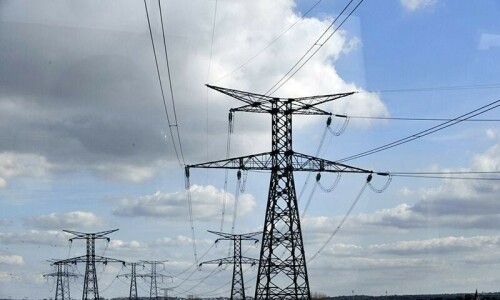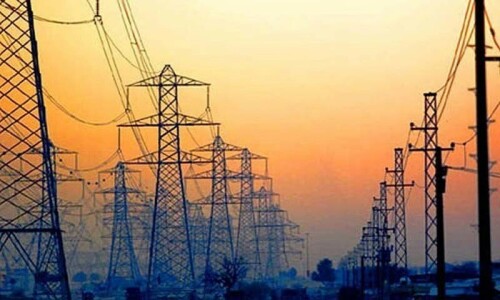THERE is nothing quite like a punch-up among the billionaires. That is exactly what we have going on these days with the whole ‘capacity payments to Independent Power Producers’ (IPPs) issue. If you’re confused about what exactly is going on and trying to figure out who is right in all of this, let me help you with one simple line: this has nothing to do with you. Relax.
Here is what’s happening: a fight has broken out between the textile lobby and the power generation companies of this country. Both sides are large controllers of capital. Both have access to organised lobbying bodies. Both command clout with the government. But one can influence the narrative as it plays out on TV much better than the other because people are already crushed under electricity bills and are preparing to experience another hike when bills for July are delivered in a couple of weeks.
The one that has gone public is the textile lobby in the hopes of mounting pressure to bring about some sort of intervention, either by the government or the courts. Their problem is that the capacity payments they are villainising as the source of all the economic problems plaguing the country are protected by sovereign guarantees that are enforceable in international arbitration councils. Their second problem is that many of these are owed to Chinese producers where contractual changes are a non-starter. Where they are not owed to Chinese producers, they have already undergone some amount of re-negotiation when the same issue came up in 2021.
Why has the textile lobby declared war on the IPPs? The simple answer is their power tariffs have been hiked. As a matter of fact, their tariffs were hiked in the middle of last year, along with everyone else’s including yours and mine, and they had grown accustomed to a subsidised tariff that was supposedly given for exporters (in fact, a study looking at who benefited from that subsidised tariff found most of the benefit was flowing to a small number of mills, which were not even large exporters. (But that’s another story). They called it the ‘Regionally Competitive Energy Tariff’, and to give it all a very professional appearance, they also gave it an acronym, RCET. In the lobbying world of policymakers, a thing doesn’t exist until it has an acronym.
So there it was. An RCET given to textile houses in the days of the PTI government had to be withdrawn because the government could no longer afford it and could find no evidence that it was spurring exports. Exports did indeed rise since the RCET was introduced, but there was little to no evidence linking that rise to the RCET, save perhaps for one study funded by the textile lobby itself.
Giving subsidised energy to the textile sector had been a long-standing demand of theirs for many years. Successive governments were wary of this lobby though, knowing their tendency to profit from government handouts, whether through energy subsidies or credit schemes or tax breaks. The PTI government caved in fast to their demand, however, and announced a sharply subsidised energy regime for textile exporters almost immediately upon coming to power.
Energy subsidies for textiles were announced in October 2018. They were expanded in January 2019, then rolled back partially by September 2020 when consensus within the PTI government around the merits of the RCET broke down. The ministers for planning, energy and finance urged the withdrawal of the RCET regime, while commerce lobbied not only for its continuation. As a compromise, the RCET was revised upward at nine cents per unit and left at that till it was finally withdrawn altogether last year.
That’s when the textile lobby mobilised to get it restarted. In late 2023, according to them, their power tariffs had risen to more than 14 cents per unit (by comparison I was billed 22 cents per unit in my last bill) and during a meeting at the energy ministry, they stumbled across what they thought was an interesting thing. They found that the structure of power tariffs in Pakistan includes a Rs14 per unit charge that is used to subsidise a lower tariff for those who consume less than 600 units per month. Seizing upon this, they started demanding that this amount be cut down and shifted either to the budget, or some other source.
The interim authorities left it for the incoming government to sort out matters. The new government offered to cut this subsidy amount partially, but then in early July came a tariff rebasing exercise under which tariffs were hiked once again, so the benefit from cutting the subsidy largely evaporated.
The textile lobby had turned on the power producers already by this point, but the impact of the tariff rebasing exercise in July led them to intensify their attack. They argue that unjust capacity charges are powering the tariff, and produce detailed findings, which they claim show power plants that were shut throughout the last financial year receiving payments of Rs3 billion, or more in some cases.
Let’s support their demand for a forensic probe into payments made to power producers. But recall that in 2021, in a similar fight, there was also a probe into ‘excess profits’ made by the IPPs and the government of that time re-negotiated tariffs, and told us that they had secured reductions totalling Rs800bn in future payments. Where are those benefits today?
Probe or no probe, don’t for a moment think that any of this is happening for you, or that it will produce reduced electricity bills for you. This is purely the textile industry making strenuous efforts to find its way back to a subsidised energy regime that they had grown accustomed to from 2018 onwards.
The core problem here is not capacity charges. The core problem is devaluation, because the dollar value of your electricity bills has not risen by much more than 30 per cent in the past decade. Check and find out.
The writer is a business and economy journalist.
Published in Dawn, July 25th, 2024















































Dear visitor, the comments section is undergoing an overhaul and will return soon.